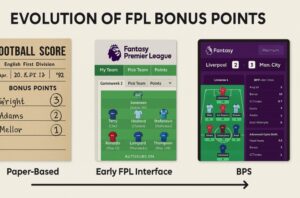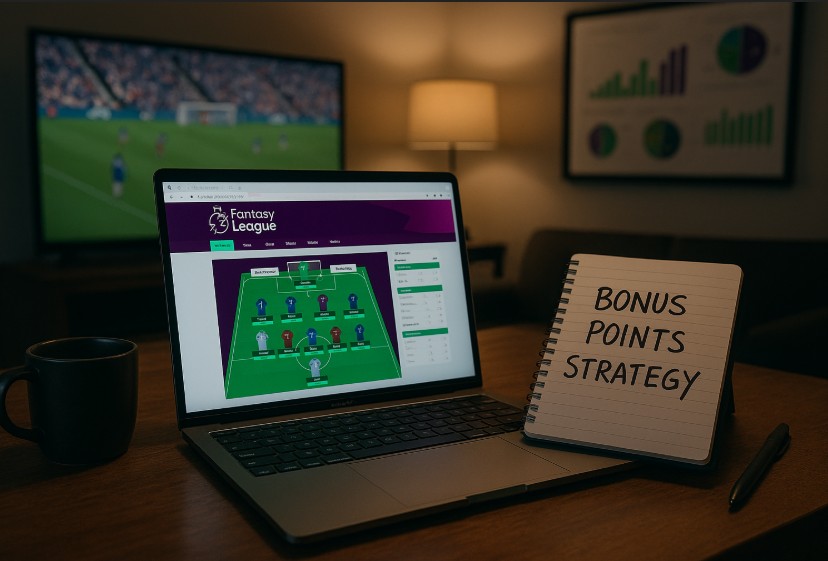Fantasy Premier League (FPL) isn’t just about picking the best players—it’s about understanding how they earn points, especially those crucial bonus points.
In tight gameweeks, these can be the difference between climbing or falling in the rankings. But how do bonus points work in FPL, and why should managers pay close attention to them?
In this guide, we’ll explain the Bonus Points System (BPS), break down how points are awarded, and show you how to use this knowledge to gain an edge in your FPL strategy.
What Is the Bonus Point System (BPS) in Fantasy Premier League?

The Bonus Point System in Fantasy Premier League is designed to reward players who deliver impactful performances that may not be immediately obvious through goals or assists.
It uses a complex algorithm provided by Opta, which tracks every on-pitch action during a match to generate a score for each player.
Once a match concludes, each player is assigned a BPS score. The three players with the highest BPS in the match receive additional Fantasy Premier League points.
These bonus points are highly influential, particularly in tightly contested gameweeks or mini-league matchups. The allocation of bonus points follows a specific system based on rank and ties.
Bonus Points Distribution Table
| Rank or Tie Status | Bonus Points Awarded |
| Highest BPS (No Tie) | 3 points |
| Second Highest BPS | 2 points |
| Third Highest BPS | 1 point |
| Tie for First Place | 3 points each to top two, 1 point to third |
| Tie for Second Place | 3 points to top, 2 points each to second/third |
| Tie for Third Place | 3 to top, 2 to second, 1 each to third and fourth |
This system ensures fair recognition of the players who contribute the most, even if they do not score or assist directly.
How Are Bonus Points Calculated in FPL?
Bonus points are calculated using detailed statistical inputs during the match. The system awards or deducts BPS points based on player actions. Every key metric is quantified, whether positive or negative.
A central feature of the calculation is that not all positive actions carry the same value. For instance, scoring a goal as a forward earns more BPS than doing so as a defender.
Defensive contributions, passing accuracy, and involvement in build-up play all add to a player’s performance score.
Sample Breakdown of BPS Points for Selected Actions
| Action Type | BPS Points Awarded |
| Playing 1–60 minutes | 3 |
| Playing more than 60 minutes | 6 |
| Goal by forward | 24 |
| Goal by midfielder | 18 |
| Goal by defender or goalkeeper | 12 |
| Assist | 9 |
| Penalty save | 9 |
| Clean sheet (GK/defender only) | 12 |
| Big chance created | 3 |
| Key pass | 1 |
| Pass accuracy 90%+ (min. 30 passes) | 6 |
| Yellow card | -3 |
| Red card | -9 |
| Own goal | -6 |
| Missed penalty | -6 |
This data-centric system ensures that every contribution is recognised, and every mistake is penalised accordingly.
Which Player Actions Contribute to Earning Bonus Points?

A variety of match activities feed into the BPS score, beyond the obvious goals and assists. Players can climb the BPS rankings through strong defensive actions, creative passing, or consistent gameplay.
Some of the most valuable positive actions include:
- Goals, with higher value for forwards due to their scoring role
- Assists, which reflect direct contribution to goals
- Clean sheets, particularly for defenders and goalkeepers
- Key passes and successful crosses
- Big chances created
- High pass completion percentages
- Shot accuracy and successful dribbles
- Defensive actions like tackles, blocks and recoveries
On the other hand, players can lose BPS for negative actions such as:
- Conceding fouls
- Receiving yellow or red cards
- Errors leading to goal attempts or actual goals
- Missing big chances
- Being caught offside
- Low shooting accuracy
It’s also worth noting that while net tackles (successful minus unsuccessful) add value, players will not be penalised with negative BPS if the result is negative.
Why Do Bonus Points Matter for Your FPL Team Strategy?
Bonus points are a crucial yet often underestimated aspect of Fantasy Premier League strategy.
Their impact can be significant, especially in closely contested matches and gameweeks where attacking returns are limited.
Managers who understand the influence of bonus points are better equipped to maximise their overall team score and long-term rank.
How Bonus Points Influence Match Outcomes?
In many FPL head-to-head and mini-league matchups, the difference between winning and losing can come down to just a single point.
In such cases, a defender or midfielder earning an extra one or two bonus points can change the outcome entirely.
These small margins accumulate over a season and can lead to a considerable shift in overall rankings.
Bonus points also add unexpected value in low-scoring fixtures. When matches end 0–0 or 1–0, clean sheets and defensive performances become decisive, often pushing defenders and goalkeepers to the top of the BPS rankings.
Hidden Value in Under-the-Radar Players
Not all valuable players in FPL are explosive scorers. Some consistently earn bonus points due to their work rate, defensive reliability, or playmaking ability.
Players like centre-backs who frequently intercept, clear, and block or midfielders with high passing accuracy often accumulate points that go unnoticed by casual managers.
Identifying these “bonus magnets” provides an opportunity to benefit from points that many others overlook. In addition, these players are often lower-owned, offering excellent differential potential.
Enhancing Captaincy and Transfer Decisions
In tight gameweeks, understanding which players tend to earn bonus can guide your captaincy choices.
For instance, some premium assets may score but fail to earn bonus due to low BPS activity, while others like Harry Kane or Bruno Fernandes often rack up additional points through involvement across all areas of play.
Bonus point trends also influence transfer planning. When evaluating two similarly priced assets, choosing the one with a stronger BPS record may result in more consistent weekly returns, particularly in balanced or low-scoring matches.
How Can FPL Managers Use Bonus Points to Gain an Edge?

Incorporating bonus point awareness into team management can give FPL managers a tactical advantage. Understanding which players consistently attract BPS and how to use that information is a sign of an experienced and strategic fantasy manager.
Tracking Bonus Point Trends Throughout the Season
Keeping tabs on bonus point trends across multiple gameweeks can reveal patterns. Some players may not frequently score or assist but are often in the bonus due to overall involvement.
Monitoring BPS averages per 90 minutes or per appearance helps identify these consistent performers.
FPL platforms and community tools such as Fantasy Football Fix, LiveFPL, or Fantasy Football Scout provide BPS tracking features.
These insights allow managers to spot players who quietly accumulate points, often flying under the radar of mass ownership.
Targeting Players with Bonus-Friendly Playing Styles
Certain player profiles are naturally more inclined to collect BPS. Defenders who dominate aerial duels, midfielders who dictate possession, and forwards who convert chances efficiently tend to rank highly. Identifying and selecting such players provides a long-term edge.
When analysing a potential transfer, consider:
- Does the player complete many passes?
- Are they involved in set pieces or playmaking?
- How often do they create big chances?
- Do they lose possession frequently or make errors?
Answering these questions can help predict a player’s likelihood of collecting bonus over time.
Applying BPS Insights to Fixture Planning
Bonus point potential should be factored into fixture analysis. In matches expected to be tight, such as two defensively solid teams facing off, it’s often defenders and goalkeepers who shine in BPS. Conversely, high-scoring matches may favour attackers with clinical finishing and multiple involvements.
For example, selecting a goalkeeper facing a team with many off-target shots and low goal conversion can be a smart play for both clean sheets and BPS.
Managers can also use BPS to guide rotation decisions or benching dilemmas. Between two budget players, choosing the one with a higher bonus return history in similar fixtures often results in a better outcome.
What Are Some Common Myths About Bonus Points in FPL?
There are several misconceptions about how bonus points are awarded in FPL, and falling for them can lead to poor selection decisions.
Many managers believe that the system favours certain types of players or that the allocation is random.
One of the most common myths is that scoring a goal guarantees bonus points. While goals are highly valued, they are only one of many factors in the BPS system.
A player who scores but also commits multiple fouls, loses possession, or fails to contribute elsewhere may still miss out on bonus.
Another frequent misunderstanding is the idea that attacking players always benefit more. In fact, central defenders and goalkeepers often pick up bonus points through clean sheets, blocks, saves and consistent passing accuracy. In low-scoring matches, these players can outperform attackers in the BPS rankings.
Lastly, some believe that bonus points are awarded manually or with bias. The reality is that BPS relies on objective data from Opta, which removes subjectivity from the scoring process.
How Have Bonus Points Evolved Over the Seasons in FPL?

The bonus point system in FPL has undergone significant changes over the years. Previously, bonus points were awarded by a panel of experts who subjectively judged players’ performances. This older method often led to inconsistencies and biases toward more popular or attacking players.
With the introduction of the BPS system in the 2012/13 season, FPL moved to a data-driven model. This created a more transparent and predictable structure for awarding bonus points, based on measurable on-pitch contributions.
Since then, small refinements have been made to the way stats are weighted. The overall structure, however, remains consistent. Managers who adapt to the evolving system and stay up to date with official scoring rules can make more informed decisions throughout the season.
How Do Bonus Points Affect Player Value and Transfers?
Bonus point consistency can significantly influence a player’s market value over time. Players who regularly earn bonus points, even without scoring or assisting, are often seen as safer and more reliable options. This can drive up their ownership and lead to price rises.
For example, a centre-back who consistently earns bonus points due to defensive contributions and clean sheets becomes more appealing during favourable fixture runs.
Similarly, a deep-lying midfielder who doesn’t score frequently but is involved in build-up play and maintains high pass accuracy may attract interest as a budget-friendly differential.
This link between bonus points and player value also plays a role in transfer decisions. A player’s likelihood of earning bonus in specific match scenarios can influence whether they are seen as worth bringing in, holding, or replacing.
Can Bonus Points Decide Your Mini-League or Overall Rank?
Yes, bonus points often play a decisive role in determining final rankings. In tightly contested mini-leagues, every point counts, and managers who understand the mechanics of BPS have a slight edge.
Over a 38-game season, the cumulative effect of bonus points can make the difference between finishing in the top 10k or 100k globally.
Many successful managers strategically plan around bonus point trends, particularly in double gameweeks, where players have more opportunities to earn them.
They also use bonus potential as a factor in choosing differentials to gain an advantage over template teams.
Consistently selecting players who earn bonus in low-scoring matches ensures a steady flow of extra points, which adds up significantly over time.
Conclusion
Understanding how bonus points work in FPL provides managers with a valuable edge. By analysing BPS data and player performance metrics, it’s possible to make more strategic decisions that go beyond just goals and assists.
From identifying consistent performers to gaining an advantage in mini-leagues, mastering the Bonus Points System is a key part of long-term succe
Incorporating this knowledge into your planning can result in more competitive squads and better overall rankings throughout the season.
FAQs About Bonus Points in Fantasy Premier League
How often are bonus points updated after matches?
Bonus points are usually finalised and awarded 30–60 minutes after the full-time whistle, once Opta has confirmed all match stats.
Do goalkeepers often get bonus points in FPL?
Yes, especially when they make several saves, keep a clean sheet, or save a penalty. Clean sheets and shot-stopping contribute heavily to BPS.
What’s the tie-breaking rule if players have equal BPS?
If players are tied for BPS, points are shared as per official FPL rules. For example, a tie for second place gives 2 points each to the tied players.
Is it better to pick players with higher bonus averages?
Definitely. Players with consistently high BPS often outperform others even if they don’t score or assist regularly.
How does clean sheet influence bonus point allocation?
Clean sheets grant 12 BPS to goalkeepers and defenders, making them strong contenders for bonus in low-scoring games.
Do substitutes get bonus points in FPL?
Yes, if they play enough minutes and perform well based on BPS stats. However, it’s rarer due to limited time on pitch.
Are bonus points more important for defenders or attackers?
It depends. In low-scoring matches, defenders often secure more bonus. In high-scoring matches, forwards dominate due to goals and assists.







